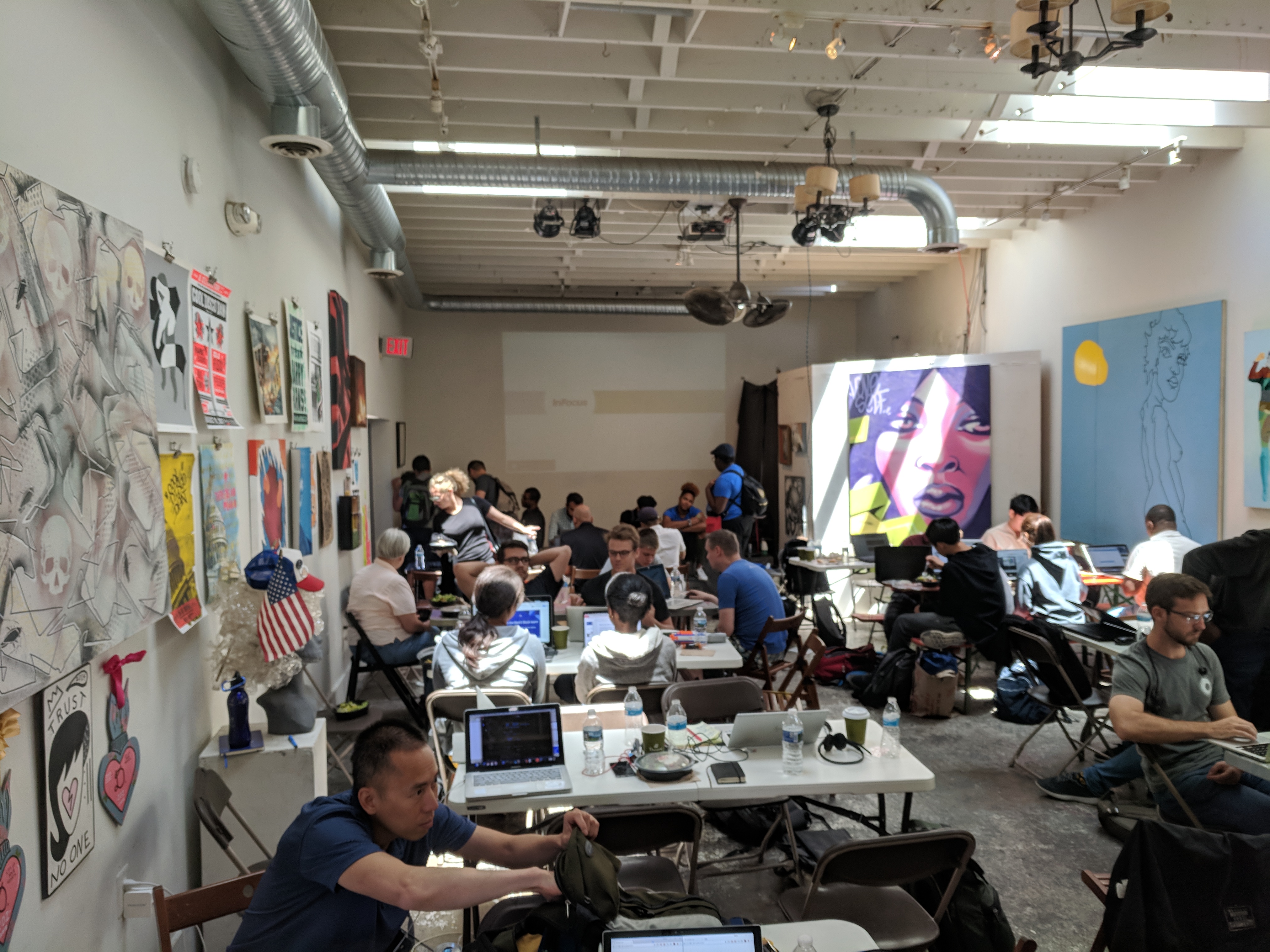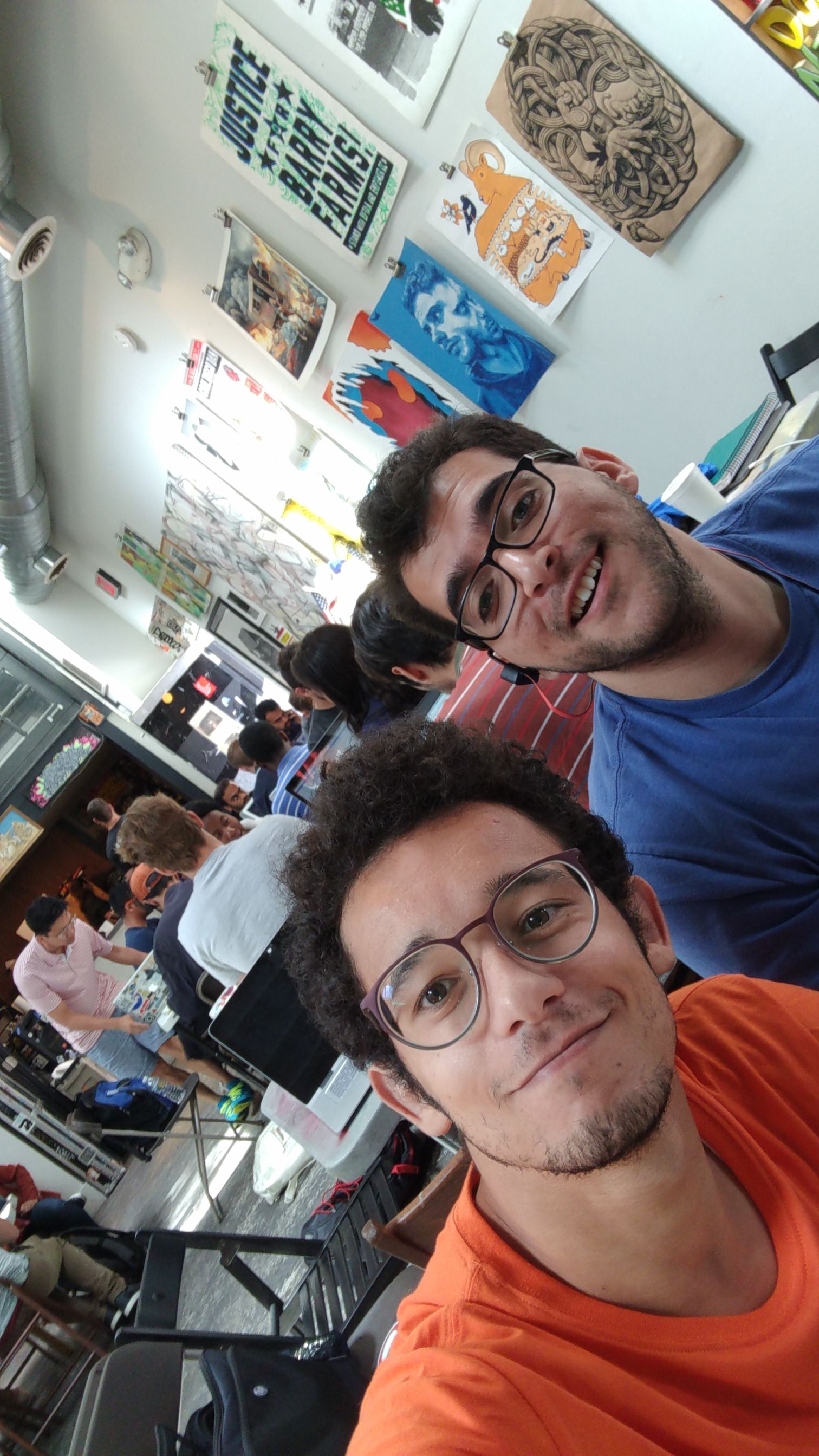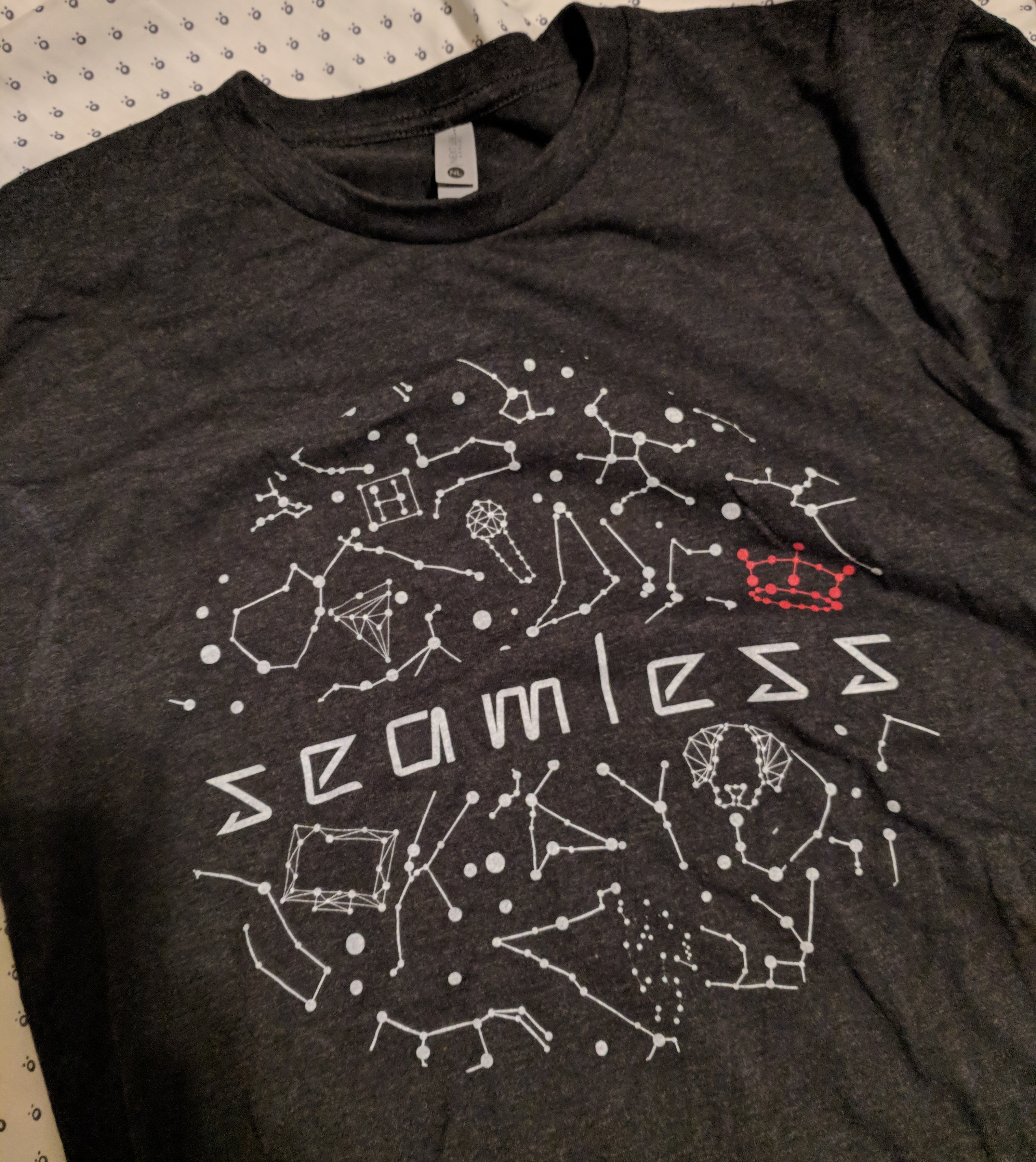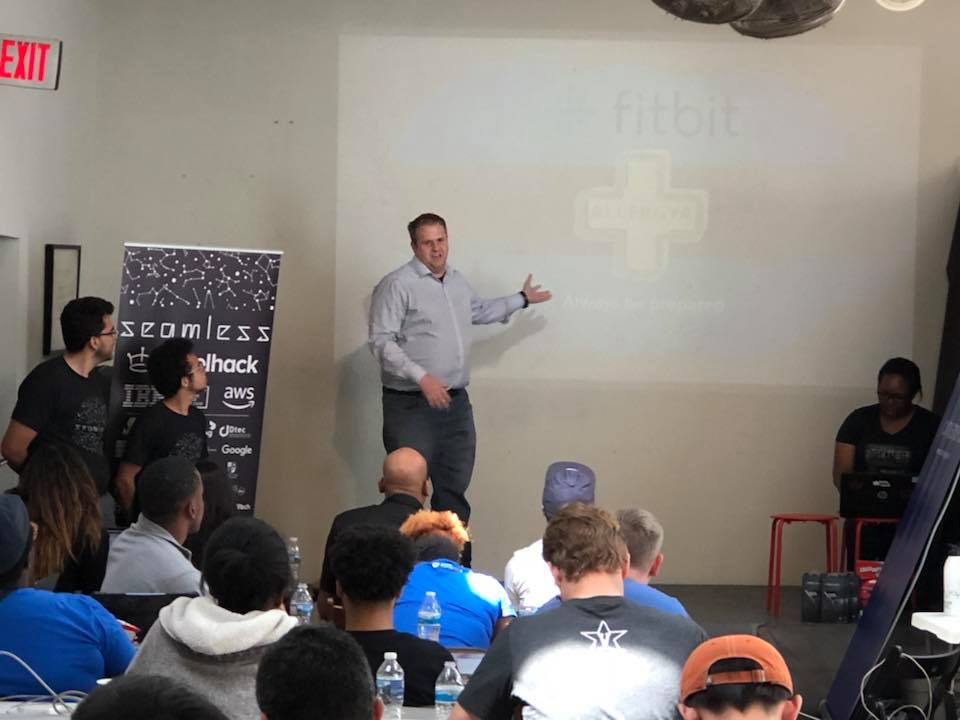I Attended My First Hackathon And It Was Awesome

I recently attended a hackathon that was organized by AngelHack in Washington DC. It was my first hackathon ever and it was unforgettable! For that, I have to thank my friend and colleague Mheni Merzouki – to whom I said “no” many times before – who insisted on me to tag along. The experience was memorable, challenging, and I learned a big deal from it. Read on for more details.

What is a hackathon?
Let’s start by breaking down the word “hackathon”. The first part is “hack” which is a common verb, and it’s funny how whenever people hear it, they start picturing a guy wearing a black hat or a hoodie, sitting in a dark room and surrounded by computers that display green or red lines on black screens whenever he rapidly types on one of his many keyboards. Well, that’s normal I guess, since that’s how movies portray hackers. No, “hack” in this context simply means “to write code”. The second part is the suffix “-athon”, which is extracted from the word marathon, and it’s a suffix that usually occurs at the end of words that have a general sense of lengthy events.
So for those who don’t know what a hackathon is. It’s an event where computer programmers, software developers, product managers, graphic designers and others, gather around to collaborate and engage in computer programming or ”hacking”. Usually hackathons last from 24 up to 48 hours, and sometimes more. Wow, 48 hours of non-stop hacking! It sounds unbelievable, doesn’t it? Well, believe it or not, people can do it.
At the end of the hacking session, a pitching session starts and that’s when the contestants present their ideas to a jury and the other competitors. Prizes and awards are granted to the winners.
Other than improving the coding skills, hackathons are a good chance for meeting new people, networking, and getting involved in the world of entrepreneurship and business.
Who organized this hackathon?
As I mentioned above, the organizers of this event were AngelHack. They are a global hackathon organization that was founded in 2011. As one of their representatives – Madison Andermahr – explained to me, every year they tour the world for a yearly Global Hackathon Series where contestants compete to create and test solutions for the given challenges, and every year these challenges fall under a specific theme. This year’s theme is Seamless Technology, and the idea of this theme is that:
Hackathons are built for rapid innovation, and rapid isn’t always pretty. But no matter the roadblock, broken code or bumps, we continue on and push forward, together. There’s no boundary or limit to what we can create.
– AngelHack.
Other than the different hackathons organized across the globe, they run a program called HACKcelerator. If hacking were a sport, the Global Hackthon Series would be the different divisions and the HACKcelerator would be the playoffs. The reason behind the creation of such program is that over a weekend each team puts a lot of effort to cook a solution that is respectable, however that is not yet at the level of a startup. So, the idea was to have a program that provides mentorship to entrepreneurs and promotes their not-yet-fully-fledged solutions to investors. You can read more about the program on its official webpage.
What was the hackathon about?
The event comprised 5 challenges in total.
- The AngelHack challenge
- Challenge: make something innovative without limits, something that brings positive change to the world.
- Prize: an invite into AngelHack’s HACKcelerator program.
- Code For A Cause Impact Award Challenge
- Challenge: build technology that solves a social or environmental problem and positively impacts your local community.
- Prize: Impact Award will be given out at each event.
- The IBM challenge
- Challenge: improve logistics based on traffic and weather activity.
- Prizes:
- First: $7500 USD to be split amongst the winning team.
- Second $2500 USD to be split amongst the winning team.
- Each submission receives 1000 cloud credits on IBM Cloudan invite into AngelHack’s HACKcelerator program.
- The Fitbit challenge
- Challenge: create an app or clock face using the Fitbit OS SDK or Web APIs to empower and inspire users to live a healthier, more active life.
- Prize: Fitbit Ionic for each team member.
- The Consensys challenge
- Challenge: build a dApp or a project using the Ethereum blockchain.
- Prize: 3 ETH to be split amongst the winning team.

Where do I fit in all this?
My colleague and I arrived at the event around 9AM, at a place called the Fridge in Capitol Hill, DC. We were greeted by the representatives, Madison and her 10 years long friend. We were offered the hackathon t-shirts, a couple of stickers each, and were invited to take whatever we wanted from the kitchenette. We were then shown a couple of available seats. Although we were on time, it was a full-house, and looked like the event was already underway, but it was not.

The schedule of the hackathon was as follows:
- Day 1
- 9:00 AM : Doors Open & Breakfast
- 10:00 AM : Opening Ceremony, Sponsor Welcomes, & Team Building
- 11:00 AM : Coding Kick Off
- 1:00 PM : Lunch
- 2:00 PM : Sponsor Breakout Sessions
- 7:00 PM : Dinner
- 10:00 PM : Pitch Workshop
- Day 2
- 8:00 AM : Breakfast
- 12:00 PM : Lunch
- 1:00 PM : Code Freeze & Submission Deadline on hackathon.io
- 1:30 PM : A/V Check
- 2:00 PM : Demos
- 4:00 PM : Winners are Announced / Prizes!
Some contestants formed their teams beforehand, others, my colleague and I included, were waiting to join/form a team. We decided to form our own. We pitched our idea and were able to convince a couple of entrants to join us. We decided to take on the Fitbit challenge that says: “…inspire users to live a healthier, more active life”. So we decided to make an app that would allow users to track allergies (tree pollen, mold, dander, etc.) in their area, and notify them to take precautions in case of extreme conditions.
Saturday - 11:00 AM. Let the hacking begin! The energy in the room was palpable. The loud sound of chatter and keystrokes washed over me after a while and turned into white noise.
Since none of us played with a Fitbit before – I personally never had one, let alone develop an app on it – we invested a couple of hours in figuring out the Fitbit APIs and the development environment. Once that was done, we split the tasks up into independent, loosely coupled pieces. My task was to interact with the AccuWeather public APIs, retrieve the allergies related data, and process them before sending them to the view logic. The 3 grande cups of coffee that I had kicked in on time, and did their job in keeping me awake for 24 hours non-stop. I spent the whole night coding in JavaScript, which is not my forte, but I am proud of what I achieved.
Sunday - 2:00 PM. It’s demo time! Presentation order was decided in a first-in first-out manner, i.e. first to submit first to present. Contestants lined up accordingly, and pitched their projects to the panel of judges. Some ideas were innovative, others were realistic, and others – with all due respect – were just crazy (e.g. a contestant wanted to raise funds to build a chapel on the moon).

What I learned from this experience?
This was my first hackathon ever, I undoubtedly learned a lot of things from this event, and on many levels.
Technical: I discovered the Fitbit development environment and APIs. I learned how to develop a fully-fledged app on Fitbit, and actually developed one that connects to the outside world, and was able to deploy it on the Fitbit Ionic that was provided by AngelHack. I learned about AccuWeather and their API. I brushed up my JavaScript knowledge. I now know how to deal with a couple of Github-related issues that kept coming up repeatedly.
Entrepreneurial: social entrepreneurship is not something that I was envisioning a lot before this hackathon. Now I am more excited about it than ever, after watching the competing teams pitch and present their ideas. And as I mentioned before, hackathons are a great chance to meet entrepreneurs and investors, pitch and sell you ideas, and enlarge your circle of contacts.
Team work: it’s really challenging and interesting to figure out how 4 strangers work and bond together, and how to split up tasks on team members fairly and based on their skillset.
Project Management: managing a whole project over 24 hours sounds very difficult, if not unfeasible. Overall, I could say that we were able to manage our resources and time effectively, since we met our deadlines and milestones, and our app was up and running by the the end of the hacking session.
What are my impressions?
Although we didn’t win the challenge, we sure did very good, since the judges, other contestants, and attendants congratulated us and appreciated our idea. And unlike other teams, we had an app that was running live and getting real-time data. And what matters most is that we had an enriching experience and a great time competing with the other teams.
It is amazing what could come out of a $10-a-ticket event. $10 doesn’t even cover the amount of food per person that was offered to us (Coffee, Breakfast, Sandwiches, Snacks, Pizza, Energy drinks, etc.).
Altogether it was a great experience, my team members were fun to work with and we bonded really well, the venue was clean, safe and comfortable, and the representatives were, knowledgeable, nice and caring. And for that, I’d recommend anyone with an opportunity to go through such experience at least once. Now, I am looking forward to other hackathons.
Special thanks
My thanks and appreciation go to:
- my friend Mheni for insisting on me to join him
- my team members Nnenna and Jonathan
- AngelHack for organizing such great events and giving us such opportunities
- Madison and Troy the representatives of AngelHack at the event
- to everyone who, directly or indirectly, contributed to this event
If you liked this post, please share it, and let me know what you think about hackathons in the comments section below.